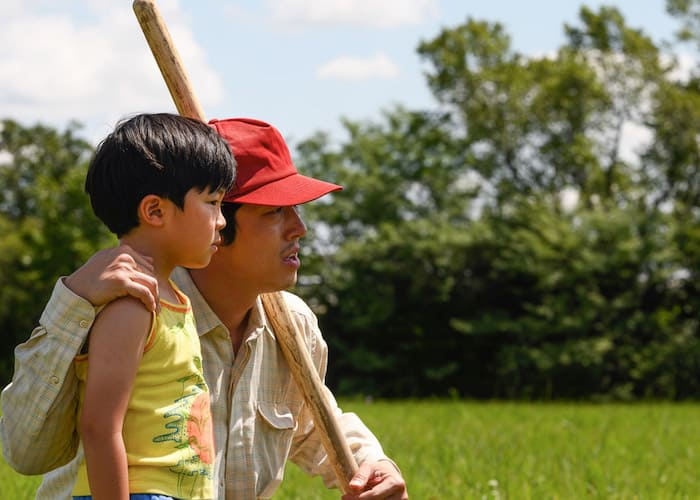
The American Dream isn’t a relic of the Gold Rush frontiersman, nor is it a distant hope of Prohibition Era pioneers, nor a forgotten aspiration of the faux-perfect 1950s nuclear family. It hasn’t gone anywhere. It simply evolved. Minari is a snapshot of that evolution, an examination of America’s ever-changing tides. For starters, by the 1980s, when the film takes place, one couldn’t assume a family in America was made up of white Americans. So, it isn’t out of the ordinary that writer-director Lee Isaac Chung’s focal family is Korean.
Realism, in all of its iterations, has been fading from the popular sphere since major studios learned how to better control the game in the 1970s with the blockbuster. But with the steady rise of riskier independent studios like A24 and Neon, great realist films are getting more opportunities to shine. Minari is one of those opportunities, and it’s a particularly golden one, wise and measured in its approach.
We open on the Yi family — father Jacob (Steven Yeun), mother Monica (Yeri Han), son David (Alan Kim), and daughter Anne (Noel Kate Cho) — pulling up to their new house in Arkansas. It’s remote and on wheels. Monica isn’t pleased. Originally from South Korea, the Yis moved to California, where they worked long and poorly paid hours as chicken sexers (those who determine the gender of a baby chick) before deciding to move to Arkansas, where Jacob could start a small farm for Korean vegetables in hopes that they wouldn’t have to spend the rest of their lives in a factory.
But it becomes immediately clear that the move was Jacob’s idea. Monica doesn’t share his dream for a home on the range, and they both still need to work the factory jobs until the farm is sustainable. Realizing they won’t be able to take care of the children on a daily basis, they fly Monica’s mother Soonja (Yuh-Jung Youn), the most badass grandma this side of the Pacific, out to live with them in their modest portable home. From there, we watch the Yis struggle to adapt, to commune, and to find meaning in it all.
Minari is that rare kind of still, collected, meditative cinema — the kind that the Cahiers du Cinema critics-turned-filmmakers once oozed over with urgency, or the kind that Yasujirō Ozu etched himself into film history as a master of — which isn’t to say it’s the “best” kind of movie, but that it’s an expression of cinema that doesn’t hold the mass’s attention like a Marvel or DC movie. Instead, it rests comfortably on the other side of the spectrum, requiring patience, contemplation, and self-reflection from viewers, which shouldn’t imply a lack of entertainment.
Where blockbusters deliver sprawling action sequences and big-budget flare, Minari delivers sprawling life through depth of character and beauty in simplicity. The butting heads relationship between Soonja and little David (around six or seven) is enough to satisfy any Minari viewer. Despite her playful attitude, Soonja is too much of a bro for David to handle. He wants her to make warm cookies, but she wants to watch sports, cuss playfully at the screen, drink Mountain Dew, and teach him how to gamble. He pees the bed and she tells everyone his penis is broken. It’s delightful.
On the opposite end of the spectrum, Jacob and Monica’s marriage gets progressively rockier, and the amount of spoken and unspoken conflict between them steadily heightens. Every argument scene, of which there are many, lingers on their disgruntled expressions of betrayal, disappointment, fear, anger, bewilderment, and pain. As the camera holds on their faces, we feel the emotion creeping into us and wait for their reactions, never guaranteed we’ll get one. The difficult realities of isolated life, especially for someone who doesn’t want it, skirt to the front of our minds. Later, Jacob enjoys a hard-earned cigarette among his burgeoning crops in the nominal light of dusk, and we’re intoxicated enough by the gorgeous simplicity of the scene to reconsider Jacob’s fight to pursue his passion for the American Dream. That is, until we remember his pursuit means risking his family’s well-being.
The selfish drive of Jacob clashes with his good nature, and we feel him ruminating on that when he doesn’t know how to respond to one of Monica’s incisive questions. We know he works tirelessly on the crops and plays lovingly with his son. He regularly extends kindness to Paul (Will Patton), Jacob’s radical Christian fundamentalist farmhand who speaks in tongues, drags a life-sized wooden cross along the road on Sundays, forces prayer into every situation, and represents both the wonderful and awful aspects of evangelicalism in the South. So, it feels nearly impossible to dismiss Jacob as purely self-absorbed. Chung doesn’t give easy outs. He develops complex characters that viewers feel several ways about at once — the kind of characters that linger in your mind long after the theater lights go up — and in doing so, allows us space to reflect and grow.
Where blockbusters blow you away, Minari absorbs you like a sponge. It can’t be expected to adhere to formulaic Hollywood clichés, which means we never know what will happen from one moment to the next. Whether tragic or beautiful or merely mundane, every scene is bursting with beauty undergirded by emotion and thought that hinges on the unsuspected actions of people who find themselves in a situation with no spoon-fed solution.
In the case of Minari, A24 might not end up giving it a wide or even limited release, but early rave reviews offer hope. If it’s anything like the Minari herb Soonja sows near the creek, it will grow anywhere and everywhere in the wild, spreading its contagious love for life as it demands screen expansions because it can’t help but capture audiences with its patient, poignant, and efficacious demeanor of realism. And if it’s really like the Minari by the creek, it will bring life, change, and flourishing in ways we can’t foresee.
Follow all of our coverage from Sundance Film Festival 2020.
Related Topics: A24, Film Festivals, Minari, Steven Yeun, Sundance

